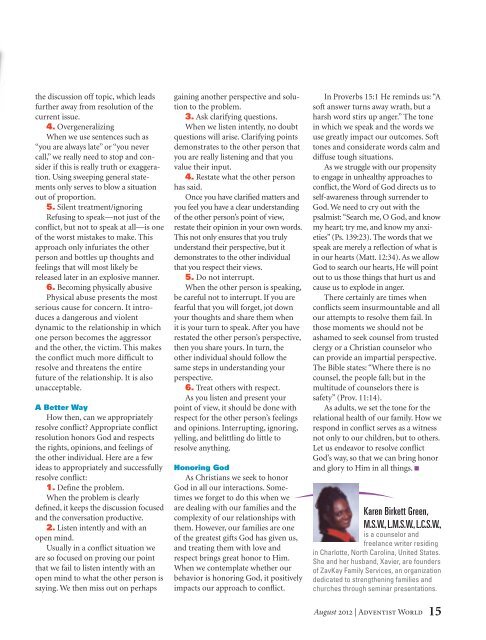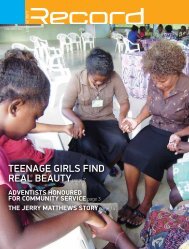Download ADVENTIST WORLD as a PDF - RECORD.net.au
Download ADVENTIST WORLD as a PDF - RECORD.net.au
Download ADVENTIST WORLD as a PDF - RECORD.net.au
You also want an ePaper? Increase the reach of your titles
YUMPU automatically turns print PDFs into web optimized ePapers that Google loves.
the discussion off topic, which leads<br />
further away from resolution of the<br />
current issue.<br />
4. Overgeneralizing<br />
When we use sentences such <strong>as</strong><br />
“you are always late” or “you never<br />
call,” we really need to stop and consider<br />
if this is really truth or exaggeration.<br />
Using sweeping general statements<br />
only serves to blow a situation<br />
out of proportion.<br />
5. Silent treatment/ignoring<br />
Refusing to speak—not just of the<br />
conflict, but not to speak at all—is one<br />
of the worst mistakes to make. This<br />
approach only infuriates the other<br />
person and bottles up thoughts and<br />
feelings that will most likely be<br />
rele<strong>as</strong>ed later in an explosive manner.<br />
6. Becoming physically abusive<br />
Physical abuse presents the most<br />
serious c<strong>au</strong>se for concern. It introduces<br />
a dangerous and violent<br />
dynamic to the relationship in which<br />
one person becomes the aggressor<br />
and the other, the victim. This makes<br />
the conflict much more difficult to<br />
resolve and threatens the entire<br />
future of the relationship. It is also<br />
unacceptable.<br />
A Better Way<br />
How then, can we appropriately<br />
resolve conflict? Appropriate conflict<br />
resolution honors God and respects<br />
the rights, opinions, and feelings of<br />
the other individual. Here are a few<br />
ide<strong>as</strong> to appropriately and successfully<br />
resolve conflict:<br />
1. Define the problem.<br />
When the problem is clearly<br />
defined, it keeps the discussion focused<br />
and the conversation productive.<br />
2. Listen intently and with an<br />
open mind.<br />
Usually in a conflict situation we<br />
are so focused on proving our point<br />
that we fail to listen intently with an<br />
open mind to what the other person is<br />
saying. We then miss out on perhaps<br />
gaining another perspective and solution<br />
to the problem.<br />
3. Ask clarifying questions.<br />
When we listen intently, no doubt<br />
questions will arise. Clarifying points<br />
demonstrates to the other person that<br />
you are really listening and that you<br />
value their input.<br />
4. Restate what the other person<br />
h<strong>as</strong> said.<br />
Once you have clarified matters and<br />
you feel you have a clear understanding<br />
of the other person’s point of view,<br />
restate their opinion in your own words.<br />
This not only ensures that you truly<br />
understand their perspective, but it<br />
demonstrates to the other individual<br />
that you respect their views.<br />
5. Do not interrupt.<br />
When the other person is speaking,<br />
be careful not to interrupt. If you are<br />
fearful that you will forget, jot down<br />
your thoughts and share them when<br />
it is your turn to speak. After you have<br />
restated the other person’s perspective,<br />
then you share yours. In turn, the<br />
other individual should follow the<br />
same steps in understanding your<br />
perspective.<br />
6. Treat others with respect.<br />
As you listen and present your<br />
point of view, it should be done with<br />
respect for the other person’s feelings<br />
and opinions. Interrupting, ignoring,<br />
yelling, and belittling do little to<br />
resolve anything.<br />
Honoring God<br />
As Christians we seek to honor<br />
God in all our interactions. Sometimes<br />
we forget to do this when we<br />
are dealing with our families and the<br />
complexity of our relationships with<br />
them. However, our families are one<br />
of the greatest gifts God h<strong>as</strong> given us,<br />
and treating them with love and<br />
respect brings great honor to Him.<br />
When we contemplate whether our<br />
behavior is honoring God, it positively<br />
impacts our approach to conflict.<br />
In Proverbs 15:1 He reminds us: “A<br />
soft answer turns away wrath, but a<br />
harsh word stirs up anger.” The tone<br />
in which we speak and the words we<br />
use greatly impact our outcomes. Soft<br />
tones and considerate words calm and<br />
diffuse tough situations.<br />
As we struggle with our propensity<br />
to engage in unhealthy approaches to<br />
conflict, the Word of God directs us to<br />
self-awareness through surrender to<br />
God. We need to cry out with the<br />
psalmist: “Search me, O God, and know<br />
my heart; try me, and know my anxieties”<br />
(Ps. 139:23). The words that we<br />
speak are merely a reflection of what is<br />
in our hearts (Matt. 12:34). As we allow<br />
God to search our hearts, He will point<br />
out to us those things that hurt us and<br />
c<strong>au</strong>se us to explode in anger.<br />
There certainly are times when<br />
conflicts seem insurmountable and all<br />
our attempts to resolve them fail. In<br />
those moments we should not be<br />
<strong>as</strong>hamed to seek counsel from trusted<br />
clergy or a Christian counselor who<br />
can provide an impartial perspective.<br />
The Bible states: “Where there is no<br />
counsel, the people fall; but in the<br />
multitude of counselors there is<br />
safety” (Prov. 11:14).<br />
As adults, we set the tone for the<br />
relational health of our family. How we<br />
respond in conflict serves <strong>as</strong> a witness<br />
not only to our children, but to others.<br />
Let us endeavor to resolve conflict<br />
God’s way, so that we can bring honor<br />
and glory to Him in all things. ■<br />
Karen Birkett Green,<br />
M.S.W., L.M.S.W., L.C.S.W.,<br />
is a counselor and<br />
freelance writer residing<br />
in Charlotte, North Carolina, United States.<br />
She and her husband, Xavier, are founders<br />
of ZavKay Family Services, an organization<br />
dedicated to strengthening families and<br />
churches through seminar presentations.<br />
August 2012 | Adventist World 15

















